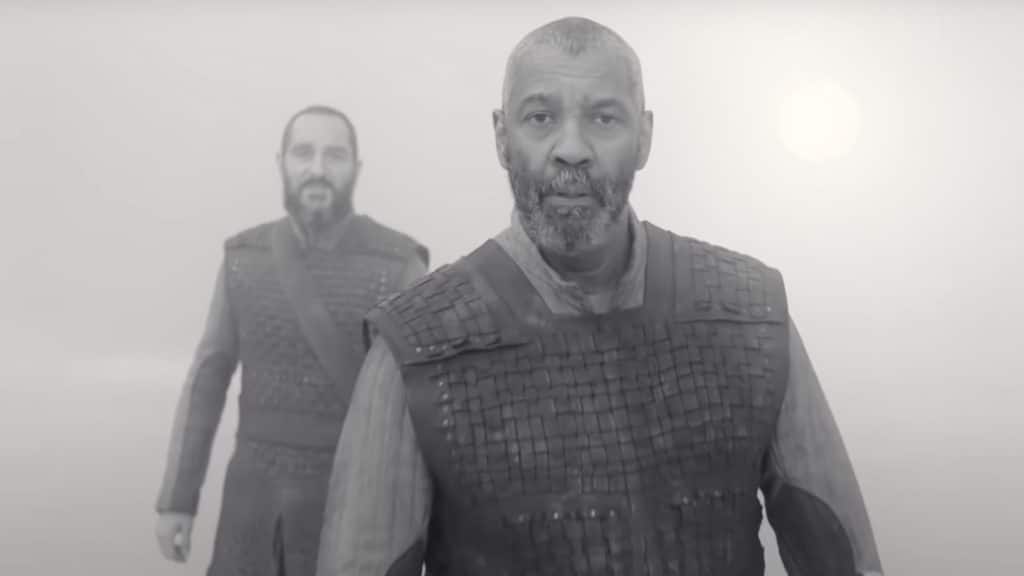Read also:
How to Watch FX Live Without CableHow To Watch AMC Without CableHow to Watch ABC Without CableHow to Watch Paramount Network Without CableJoel Coen steps out on his own & directs a powerhouse cast in an extra-dark version of Shakespeare’s tale of ambition & absolute power.
(This is part of our ongoing NYFF coverage.)
What’s a lone Coen brother to do? For nearly forty years, these siblings have been two halves of a filmmaking whole. Now, they’ve reached a fork in the road: according to their longtime composer, Ethan just doesn’t want to make movies anymore. Joel has set his sights on Macbeth.
Those interested in a modernized revamp of Shakespeare’s text, rewritten for the silver screen, will have to look elsewhere. The language and arc remain in The Tragedy of Macbeth: after quelling a bloody revolt, Macbeth (Denzel Washington) speaks to a trio of witches (all played magnificently by Kathryn Hunter), who foretells that he will become King of Scotland. With some prodding encouragement from his wife (Frances McDormand), Macbeth slices and stabs his way to the throne, only for his ensuing cruelty and paranoia to sow the seeds of his own demise.
You know this story – as always, staging Shakespeare relies on inspired choices in adaptation. Formally, Coen refuses to abandon Macbeth’s theatrical roots. In pristine, 4:3 black-and-white, his camera is very still, capturing every detail of the actors’ faces and the expressionist, almost art-deco set design. Instead of getting caught up in historical accuracy, most of Tragedy takes place on soundstages meant to simulate the outdoors. These finely composed frames give the viewer enough time to settle into each space – just as an audience adjusts to looking at a stage when attending a play.
This synthesis of cinematic and theatrical leans towards the latter, producing an exciting and fascinating merger of mediums. There are shades of Fritz Lang and Ingmar Bergman in these foggy, bleak shots, each constructed to match the mood of the performer at the center of the scene. Coen seems to understand that if anyone – in front or behind the camera – is going to pull you into the truth and meaning of this material, it’ll be the actors. That’s how the play was meant to function; that’s what’s worked for the last 400 years.

And it works here too – of course it does, with Denzel Washington and Frances McDormand as co-leads. Washington makes a rather sympathetic tyrant, a man who can only dull his jealousy and indecision by getting drunk with power. He’s an intoxicating mix of intelligent, ambitious and conflicted, not quite righteous, not entirely villainous. As you’d expect, McDormand fits like a glove into the role of Lady Macbeth (she actually already played the part in a 2016 stage production). Imagine the actress expressing the line “screw your courage to the sticking place and we’ll not fail,” and you still won’t conceive of the brisk and sharp needle she finds in the words. McDormand locates terrifying determination without crossing into utter inhumanity – a performance this bitter leaves a lasting impression.
There aren’t any weak links in the ensemble, but casting two older actors as the Macbeths is Coen’s most profound decision. You can’t exactly see them as youthful opportunists. For this couple, their power play is a last-ditch effort; they’re doomed to die sooner rather than later, even before anyone becomes Thane of Cawdor. No matter how much they take, they’ll only keep it for so long – at least some of the “tragedy” here is an existential issue.
Thus, Joel’s choice to make Macbeth becomes a little clearer: he’s been crafting movies about the haunting futility of our actions since before I was born. Then again, he used to have a partner in these efforts (well, one besides his wife). Will the Coen brothers reunite, or has the sun already set on their days of collaboration? Is it too much of a stretch to connect Joel’s interest in this play with the apparent end of his and Ethan’s partnership? Their past is past, and “tomorrow and tomorrow and tomorrow creeps in this petty pace from day to day, to the last syllable of recorded time, and all our yesterdays have lighted fools the way to dusty death.” Ethan or not, what a fleeting gift, hearing Denzel Washington deliver these lines.